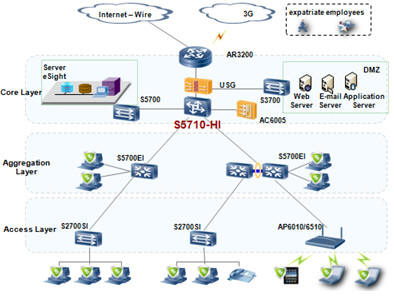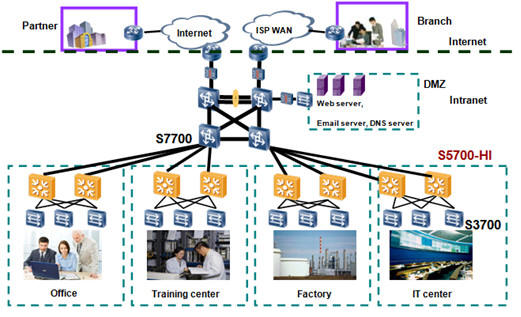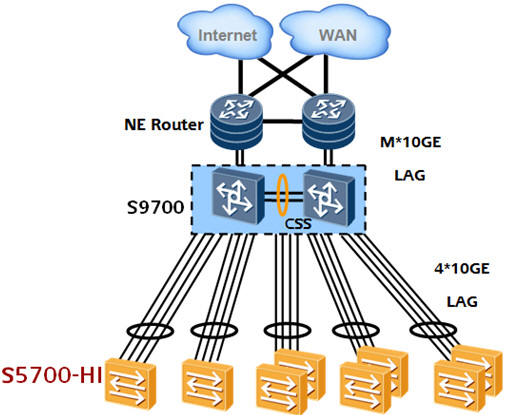The S5700-HI series
(hereafter referred to as S5700-HI) are advanced gigabit Ethernet
switches developed by Huawei, providing flexible gigabit access and
10G/40G uplink ports. Based on next-generation, high-performance
hardware and Huawei Versatile Routing Platform (VRP), the S5700-HI
provides excellent NetStream function, flexible Ethernet networking,
comprehensive VPN tunneling technologies, diversified security
mechanisms, mature IPv6 features, and are easy to manage and
maintain. All these features make the S5700-HI the best choice as an
access switch on large and medium-sized campus networks or data
centers and aggregation switch on small campus networks.
Note: S5700-HI mentioned in this document refers to the whole
S5700-HI series including S5710-HI, and descriptions about S5710-HI
are unique features of S5710-HI.
The following models are available in S5700-HI series:
| Appearance | Description |
|---|---|
|
|
|
|
|
|
|
|
|
| Item | S5700-28C-HI | S5700-28C-HI-24S | S5710-108C-PWR-HI |
|---|---|---|---|
| Fixed Ports | 24 x 10/100/1,000 Base-T | 24 x 100/1,000 Base-X | 48 x 10/100/1,000 BASE-T, 8 x 10 GE SFP+ |
| Extended Slots |
1 extended slot: Optional subcard 1: 2 x 10 GE SFP+ Optional subcard 2: 4 x 10 GE SFP+ Optional subcard 3: 4 x 1,000 BASE-X |
3 front extended slots: Optional subcard 1: 16 x 10/100/1,000 BASE-T Optional subcard 2: 16 x 1,000 BASE-X 1 rear extended slot: Optional subcard 1: 4 x 10 GE SFP+ (no GE auto adaption) Optional subcard 2: 4 x 40 GE QSFP+ |
|
| MAC Address Table |
IEEE 802.1d compliance 32K MAC address entries MAC address learning and aging Static, dynamic, and blackhole MAC address entries Packet filtering based on source MAC addresses |
IEEE 802.1d compliance 456K MAC address entries MAC address learning and aging Static, dynamic, and blackhole MAC address entries Packet filtering based on source MAC addresses |
|
| VLAN |
4K VLANs Guest VLAN and voice VLAN GVRP MUX VLAN VLAN assignment based on MAC addresses, protocols, IP subnets, policies, and ports 1:1 and N:1 VLAN Mapping |
||
|
Reliability |
RRPP ring topology and RRPP multi-instance Smart Link tree topology and Smart Link multi-instance, providing the millisecond-level protection switchover SEP ERPS (G.8032) BFD for OSPF, BFD for IS-IS, BFD for VRRP, and BFD for PIM STP (IEEE 802.1d), RSTP (IEEE 802.1w), and MSTP (IEEE 802.1s) BPDU protection, root protection, and loop protection |
||
| MPLS Features |
MPLS L3VPN MPLS L2VPN (VPWS/VPLS) MPLS-TE MPLS QoS |
||
| IP Routing | Static routing, RIPv1/v2, OSPF, IS-IS, BGP, and ECMP | ||
| IPv6 Features |
Neighbor Discovery (ND) Path MTU (PMTU) IPv6 ping, IPv6 tracert 6to4 tunnel, ISATAP tunnel, and manually configured tunnel ACLs based on the source IPv6 address, destination IPv6 address, Layer 4 ports, or protocol type IPv6 Static routing, RIPng, OSPFv3, IS-ISv6, BGP4+, and ECMP |
||
| Multicast |
IGMP v1/v2/v3 snooping and IGMP fast leave MLD v1/v2 snooping Multicast forwarding in a VLAN and multicast replication between VLANs Multicast load balancing among member ports of a trunk Controllable multicast Port-based multicast traffic statistics IGMPv1/v2/v3, MLDv1/v2, PIM-SM, PIM-DM, PIM-SSM, and MSDP |
||
| QoS/ACL |
Rate limiting on packets sent and received by an interface Packet redirection Port-based traffic policing and two-rate three-color CAR Eight queues on each port WRR, DRR, PQ, WRR + PQ, and DRR + PQ queue scheduling algorithms WRED Re-marking of the 802.1p priority and DSCP priority Packet filtering at Layer 2 to Layer 4, filtering out invalid frames based on the source MAC address, destination MAC address, source IP address, destination IP address, TCP/UDP port number, protocol type, and VLAN ID Rate limiting in each queue and traffic shaping on ports |
||
|
Security |
User privilege management and password protection DoS attack defense, ARP attack defense, and ICMP attack defense Binding of the IP address, MAC address, interface, and VLAN Port isolation, port security, and sticky MAC Blackhole MAC address entries Limit on the number of learned MAC addresses 802.1x authentication and limit on the number of users on an interface AAA authentication, RADIUS authentication, HWTACACS+ authentication, and NAC SSH v2.0 Hypertext Transfer Protocol Secure (HTTPS) CPU defense Blacklist and whitelist |
||
| OAM |
Hardware OAM: EFM OAM CFM OAM Y.1731 performance test (hardware-level delay and jitter detection) |
Software OAM: EFM OAM CFM OAM Y.1731 performance test |
|
| Management and Maintenance |
iStack MAC Forced Forwarding (MFF) Virtual cable test SNMP v1/v2c/v3 RMON Web-based NMS System logs and alarms of different levels 802.3az EEE sFlow NetStream Dying gasp |
||
| Operating Environment |
Operating temperature: 0℃ to 50℃ Relative humidity: 5% to 95% (non-condensing) |
||
| Input Voltage |
AC: Rated voltage range: 100V to 240V AC, 50/60 Hz Maximum voltage range: 90V to 264V AC, 50/60 Hz DC: Rated voltage range: –48V to –60V, DC Maximum voltage range: –36V to –72V, DC |
||
| Dimensions (W x D x H) |
442 mm x 220 mm x 43.6 mm |
442 mm x 470 mm x 87.2 mm | |
| Power Consumption |
< 76W |
< 80W |
< 1,680W (Device: 240W, PoE: 1440W) |
|
The product information may contain the product
functions provided in future. For the actual product
specifications, contact Huawei local sales office. |
|||



| Product Description |
|---|
| S5700-28C-HI-24S (24 x Gig SFP, with 1 interface slot) |
| S5700-28C-HI (24 x Ethernet 10/100/1,000 ports, with 1 interface slot) |
| S5710-108C-PWR-HI (48 x Ethernet 10/100/1,000 ports,8 x 10 Gig SFP+, PoE+, with 4 interface slots) |
| 2 x 10 Gig SFP+ interface card (used in S5700-HI series) |
| 4 x 10 Gig SFP+ interface card (used in S5700-HI series) |
| 4 x Gig SFP interface card (used in S5700-HI series) |
| 16 x Gig SFP Interface Card (used in S5710-HI series) |
| 16 x Ethernet 10/100/1,000 ports Interface Card (used in S5710-HI series) |
| 4 x 40 Gig QSFP+ Interface Card (used in S5710-HI series) |
| 4 x 10 Gig SFP+ Interface Card (used in S5710-HI series) |
| 170W DC Power Module (used in S5700-HI series) |
| 170W AC Power Module (used in S5700-HI series) |
| 350W AC Power Module (used in S5710-HI series) |
| 1,150W AC PoE Power Module |